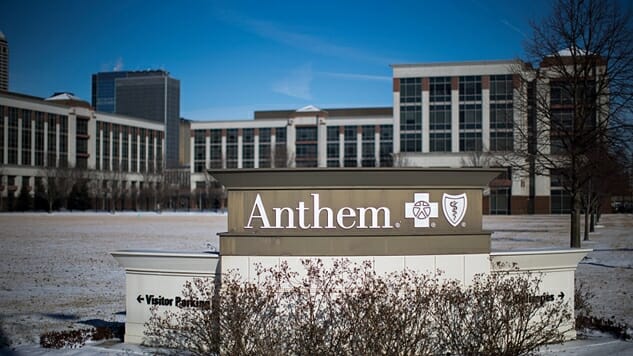Private Health Insurance Costs Are Rising Faster than Your Income
Photo by Aaron P. Bernstein/Getty Politics Features Health Care
One of the central talking points of those in favor of our current health care system (or those who say they are not, but are nonetheless opposed to any vast structural challenges) is how polls like this from Gallup demonstrate that people like their health insurance. While that is true, and it is the central political challenge of passing any major health care overhaul, simply tossing that figure out does not provide enough context for why people say they like their health insurance.
It’s a bit like asking someone who is bolted to the wing of a plane without a parachute at 10,000 feet if they would prefer to be bolted to the outside of the plane or if they will take their chances with gravity. Obviously riding on the wing is preferable to plummeting to your death, but what would be truly ideal is to get inside the plane. Because the United States does not really have an option for those without insurance, simply having insurance is a legitimate blessing. The alternative of no insurance is too catastrophic, hence why most people say they “like” their private insurance, since really the only alternative in America is having no health insurance.
But no one likes insurance companies. Everyone dreads having to call claims adjusters to try to convince them to pay you money you have been paying them to potentially provide one day. Because private insurance is driven by a profit motive, and not care for its consumers, the business model of insurance is essentially forcing people to pay fees, premiums and deductibles while paying out as little as possible when it comes time for insurance companies to do the actual work of insurance companies. Barely anyone gets the warm and fuzzies thinking about his or her insurance company, and most people don’t have affordable insurance, as this new study from the Leonard Davis Institute of Health Economics at Penn University proves.
Family premiums for employer health insurance chews up over 20% of income in every state, around 30% on average pic.twitter.com/0OYQOYd3mi
— People’s Policy Project (@PplPolicyProj) April 2, 2019
This is the logical conclusion of private insurance. Profit matters more than care, and so people’s ability to pay for their insurance has no bearing on the price of it. According to this study, employer-sponsored insurance premiums have been steadily rising this decade and that is entirely due to private insurance’s profit motive (also aided by the Affordable Care Act mandating more customers into private insurance’s waiting arms, and the fact that wages have been stagnant for nearly a half-century). Capitalism always needs more and more to grow. By the definition of capitalism, nothing is ever enough. There is always room for more profits.
No one likes paying 30% of their income to a company they know will try to wriggle out of paying for their health care should the worst happen, but the alternative of not having that option is deadly. Medicaid has been attacked nonstop by politicians in both parties, and there simply is no safety net for Americans who lose their job. Private insurance is essentially holding a gun to our head while cleaning out our pockets (reminder that even the Koch Brothers funded a study that found that Bernie Sanders’ Medicare for All plan would cost $2 trillion less over the next 10 years than our current setup).
In 2001, Princeton’s Center for Economic Policy found that self-employed people are 25% less likely to have health insurance than office workers. This is why companies like Uber are so profitable. Paying for health care is expensive, and the easiest way to offload that burden is to turn everyone into a freelancer or a contractor. That is the short story of the American economy the last 40 years, and the desperation that dynamic has created directly informs why people value their private insurance so much.
In 2009, the American Journal of Public Health calculated that 45,000 people die each year as a direct result of being uninsured. According to the CDC’s numbers, that 2009 figure would be the 10th leading cause of death in 2016 America. It’s no mystery why people say they like their private insurance, given that the alternative is death and/or bankruptcy. Knowing that the cost of private insurance is rising faster than wages, the central question isn’t can we afford a new health care system, but can we afford our current one?
Jacob Weindling is a staff writer for Paste politics. Follow him on Twitter at @Jakeweindling.